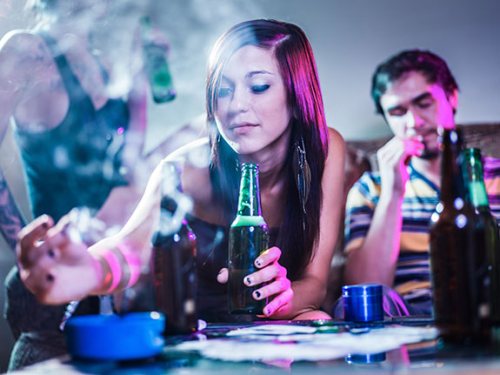
October is National Substance Abuse Prevention month. Awareness months can be excellent way to bring up tough topics with your kids. According to statistics from the National Survey on Drug Use and Health, most people use drugs for the first time when they are teenagers. While there has been a decline overall in some substance abuse by teenagers in 2015, they are still reporting use of alcohol, marijuana, and tobacco. Below is some information that can help you discuss and educate your child on substance abuse prevention.
What is Substance Abuse?
Substance abuse is the harmful use of psychoactive substances, this includes alcohol, tobacco, and illicit drugs. Use of these substances can lead to dependency, difficulties controlling use, and a higher priority to the substance than to other activities. The toll for substance abuse is not only to the individual, but to those around them and their communities. Hospitals and emergency rooms are affected by the physical trauma of the negative decisions of those who abuse substances, and jails and prisons deal with the fallout of impaired decisions because of this issue.
Warning Signs
Some of the physical signs to be aware of if you suspect your child may be abusing substances are:
- bloodshot eyes
- changes in appetite or sleep patterns
- deterioration of grooming habits
- unexplained injuries
- impaired coordination
- unusual odors
Behavior signs that may indicate substance abuse are:
- skipping class, trouble in school, loss of interest in extracurricular activities
- missing money, valuables, or prescription drugs
- acting silent and withdrawn
- sudden change in relationships
- frequently getting into trouble
- use of incense or perfume to hide other odors
Psychological warning signs of substance abuse include:
- sudden change in personality
- mood changes
- irritability
- periods of unusual hyperactivity or agitation
- lack of motivation
- anxiety or paranoia for no apparent reason
A lot of these warning signs will seem familiar, because they are also often linked to warning signs of mental health conditions. That is because drug use in adolescents frequently intersects with other mental health issues. Some children may begin taking drugs to deal with depression or anxiety, some children develop mental health conditions because they are abusing substances. Effective treatment requires addressing the substance abuse and mental health conditions at the same time.
Prevention and Education
Studies have shown that education and prevention aimed at children and teenagers is the best course to curb substance abuse in general. Explaining to your kids the risks involved when drinking or consuming a substance that impairs judgement provides them with the best possible information to make informed decisions. Remind them how addictive substances can become, and that this dependency has a huge impact on people’s lives, their families and communities. Impaired judgement can lead to car accidents, consumption of tobacco can cause certain types of cancer, and alcohol poisoning can cause death.
Share your state and local laws with them, remind them that there are criminal penalties for underage consumption of substances. For example, even if marijuana is legal in your state, that is only for people 21 and older; furthermore, it is still illegal on the federal level. Additionally, the consumption of illegal substances has a negative impact on a developing brain. Cannabis use by teens has been linked to abnormal changes in brain structure related to memory and the earlier a teen starts smoking the worse the effects on the brain.
How to Say No
But it is not always easy to just say no. Unfortunately in our culture, the word no is not always readily accepted or respected. And some kids have a hard time saying a hard no, they don’t want to come off as uncool or judgmental. Even as adults, we struggle with this. Tweens and teens are in need of more phrases at the ready, and actionable responses for when the need arises. For example, if they are at a party that has alcohol and they can’t get a ride home immediately, they can find a cup and fill it up with water, stemming peer pressure before it can begin. Below are some suggestions on how to say no, let your child know that you are willing to be the “bad guy” and they can always blame you for why they are saying no.
Suggestions for how to say no include:
- No, thanks. I’m allergic to alcohol on my mom’s side.
- My dad used to smoke pot when he was in college, and now he can smell it from a mile away. Can’t do it.
- Hey man, don’t drive if you’ve been drinking. Let’s call my parents, they’ll be cool. They’d rather pick us up here than jail.
- That’s OK, I’m trying to quit.
- I really can’t, I’ve too much to do tomorrow. Can’t be hung over and run laps for track.
Remind your kid that you expect them to find ways to say no and to not abuse substances, but that you will always be there for them if and when they mess up. Explain that you do not condone such behavior, but that you are willing to come and rescue them from any uncomfortable situation they find themselves in. Discussing and educating your kids on how abusing substances can make a negative impact on their lives is the best way to prevent substance abuse in the first place. Bark can help by monitoring your child's social media accounts and alerting you to any messages about drug content.
Resources:
Read more
Bark helps families manage and protect their children’s digital lives.




